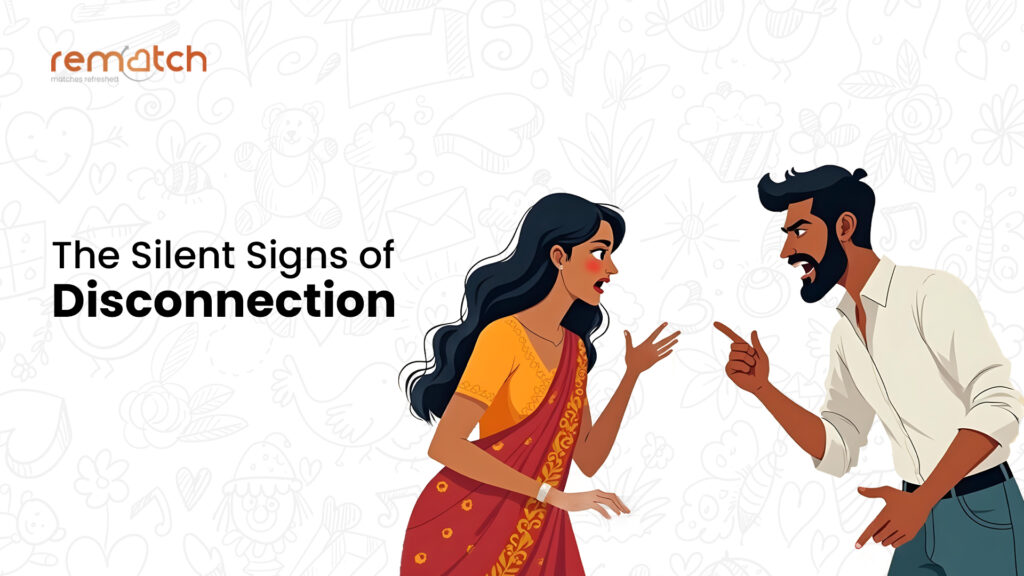
Ever described an incident that happened at the office to your romantic partner to see their eyes glassed over? Many of us have encountered silent signs of disconnection in our romantic relationships and communication. If you find yourselves having the same arguments repeatedly, it’s likely that your partner isn’t truly understanding your perspective.
“He would forget the shopping list but come home with a birthday gift for his friend for a party that fell in the next week. It was very irritating,” remembered Lila, a young copywriter, about her ex-husband.
When our partner can remember trivial details but forgets important requests or discussions, it’s a clear sign of inattentiveness. Another sign of disconnect is when our partner apologises but doesn’t follow through with changes in behaviour. It suggests a lack of genuine understanding.
Experts opine that partners avoiding difficult conversations or changing the subject can hinder effective communication. Endless, unproductive arguments often indicate a breakdown in listening and understanding. One partner becoming defensive or lashing out during discussions may be a sign of feeling unheard.
“I had a really difficult pregnancy due to high blood pressure and related complications. My husband would constantly compare me to his sisters, who all had apparently given birth with ease! It was hurtful and insensitive!” remembered Disha, a journalist from Bhopal. “He was like a know-it-all, and had this constant need to be right in any discussion.”
If our partner is constantly distracted, it can make us feel unimportant and unheard. Body language like avoiding eye contact, turning away, or sighing can signal disengagement.
According to psychologist Betsy Holmberg, stress response can physically impair our ability to listen. When we feel stressed or unsafe, our bodies prioritise survival mechanisms, narrowing our auditory focus. By calming our stress response and creating a safe environment, we can improve our ability to listen actively and empathetically. And this is especially true of romantic partners.
The Science of Listening
So, how does one bridge the communication gap in romantic relationships?
“My wife would not tidy up immediately after changing her clothes or in the kitchen. It used to cause me a lot of stress. Instead of blaming her, I talked openly to her about the stress it was causing me since I was borderline obsessive-compulsive about tidiness. We’ve come to a compromise now. She tries to keep things picked up after her. At times, she forgets. And I try not to become angry about it,” said Mahesh, a professor from Chennai.
Betsy Holmberg mentions waiting for the right time to convey information that is important. If your partner is worried or stressed about something else, they will not be able to listen to you due to their body’s stress response.
To foster healthier communication in romantic relationships, consider these tips:
- If a conversation becomes heated, take a break and return to it later. Try to understand your partner’s perspective, even if you disagree.
- Consider if your communication style may be contributing to the issue. Look for non-verbal clues and verbal clues from your partner.
- Assume positive intent and avoid jumping to conclusions. Paraphrase what your partner said in your own words to ensure that you understood her/him right.
- Address the issue directly and openly, expressing your feelings of being unheard.
- Use “I” statements. Focus on your feelings rather than blaming your partner. Share your emotions honestly and vulnerably.
- Pay attention to your partner, maintain eye contact. Allow her/him to speak without interruption.
By understanding the signs of poor listening and implementing these strategies, you can strengthen your communication and deepen your connection with your partner.
Keep these tips in mind while communicating to make yourself heard. Join Rematch today for more such tips to improve your relationship health.
#relationship, #relationshipgoals, #disconnection, #romaticrelationship, #miscommunication, #scienceoflistening

